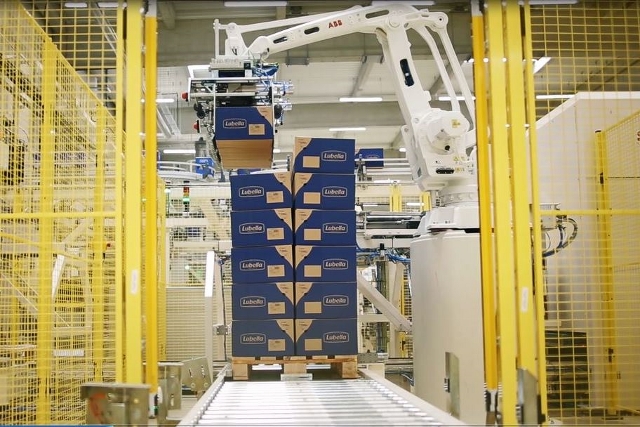A leading Polish pasta producer, Lubella, has launched a new production plant with an automated logistics centre. It consists of a production and storage hall with technical infrastructure, a forwarding and order picking zone and a modern line. The whole facility is highly automated.
Lubella has a nearly 33-percent share in the pasta market in Poland; it is also a vice-leader in the breakfast cereals market and one of the major producers of flour. Every year, the company purchases over 100 thousand tonnes of wheat. It is used to make around 70 different product items, which is a huge challenge for the company’s logistics function. This is especially because the products under this brand go not only to the Polish market but also to over 20 other countries. They are exported, among others, to Belgium, Bosnia, Canada, Ireland, Island, Latvia, Lithuania, the Netherlands, the UK and the USA.
The production of Lubella’s key product, i.e. pasta, is not a very technologically sophisticated process. The line is able to manufacture over 4 tonnes of pasta per hour and 100 tonnes per day. The flour goes to the agitator, where it is turned into dough. Then, it is the machines to achieve the right shape. After that, it undergoes the process of drying, which takes from 1.5 to 3 hours (depending on the type of pasta).
Lubella automated its packing system
The further we go into the production process, the more important the logistics function is. After cooling it down to the ambient temperature, the product is packed – first into the bags, and then into the boxes, and finally put on the pallets. As all the processes are automated, the facility needs only a few people employed.
After the pasta has been packed, it goes to an automated high-bay warehouse, which consists of 12 levels and nearly 26 thousand pallet spaces. The facility is not only large but also highly technologically advanced. It uses modern automation systems which identify the pallets right away and automatically transport them to the storage zone.
The modern technologies that we use allow us to create new products adapted to the market trends and consumer needs. Logistics investments give us a competitive advantage in trade – they help us to sell our products faster and more efficiently,” said Krzysztof Pawiński, Presidents of Maspex (Lubella is one of the companies in the Maspex Group).
Satellite stacker cranes for dense storage
For fifteen years, since Lubella joined the Maspex Group, the company has been investing mainly in the automation of production and logistics and development of the raw materials base (including milling of cereals – Lubella is the only producer of cereal products in Poland that mills the cereals on its own).
As a result of these investments, a total area of the warehouses belonging to Maspeks in Poland and abroad has reached about 220 thousand square meters. The logisticians from Maspeks can use 400 thousand pallet spaces and prepare 20 thousand pallets for shipping and loading per day, which gives 4.5 million per year.

To improve efficiency, the company has combined logistics, production and planning processes and completely automated all the processes in the newly established Maspeks’s centres. It allows it to individually prepare deliveries for their commercial partners.
All the Maspeks’ warehouses do not only apply IT systems, but also a new method of order picking, which is a method of picking pallets from storage spaces called Fast Rotation Storage. It is based on the shuttle movement of satellite stacker cranes, which enable very dense storage of the products in a limited area. Everything is done practically without human work involved.
Photo: Pixabay/Taken









